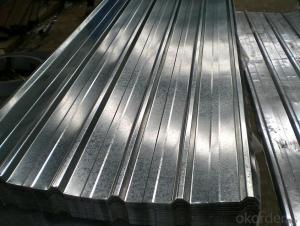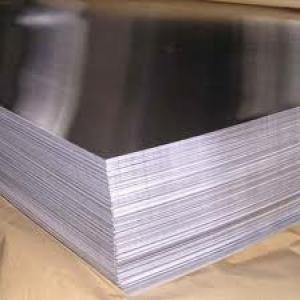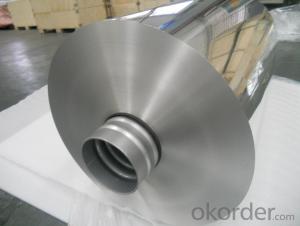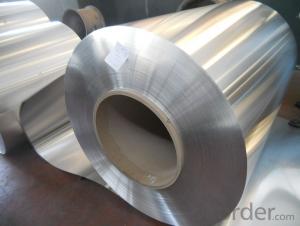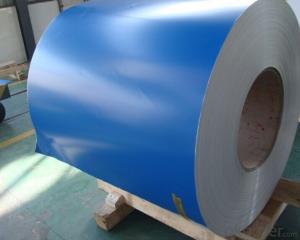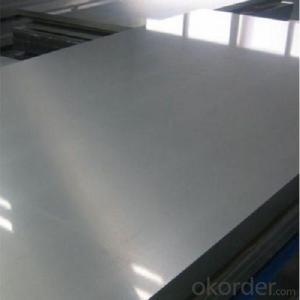Corrugated Aluminum Panel in Different Corrugation Profiles
- Loading Port:
- Shanghai
- Payment Terms:
- TT OR LC
- Min Order Qty:
- 5 m.t.
- Supply Capability:
- 60000 m.t./month
OKorder Service Pledge
OKorder Financial Service
You Might Also Like
Item specifice
Corrugated Aluminum Panel in Different Corrugation Profiles
Specifications
Alloy NO. | Thickness | Width | Length | Production line | Circulation size |
1050 1060 1100 3003 | 0.3-9.5mm | 800--2200mm | 1000--10000mm | DC,CC | 1220*2440mm 1250*2500mm 1500*3000mm 1000*2000mm
|
5052 5083 5454 5754 5086 | 0.5-150mm | 800--2200mm | 1000--6000mm | DC | |
6061 | 5-150mm | 800--2200mm | 1000--10000mm | DC | |
7075 | 6-150mm | 800--2200mm | 1000--10000mm | DC | |
Packing | Stick blue film→plastic film→waterproof paper→1~2 tons on a export standard pallet(corner protection) | ||||
Application | decoration:ceilings,walls,furniture,cabinets,elevators,signs,name plate, transportation, cookware, household appliances:refrigerators,microwave ovens, machinery, mold making,aerospace and military aspects, auto, PP cap , construction etc | ||||
Standard | Chemical Composite: GB/T 3190-2008, JIS, EN, ASTM | ||||
Mechanical Property: GB/T 3880.2-2012, JIS, EN, ASTM | |||||
MOQ | 5TONS | ||||
Kind attention | Specifications can be customized as the customer’s requirements | ||||
Application
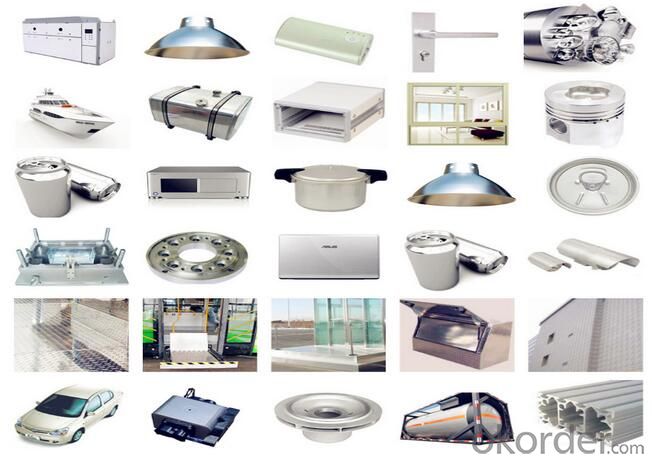
FAQ
Q: Can you provide free samples?
A: Yes, free samples will be sent to you on freight at destination.
Q: Can I get your latest catalogue?
A: Yes, it will be sent to you in no time.
Q: What are your payment terms?
A: We accept L/C, D/A, D/P, T/T, West Union, etc
Q: Can you provide free samples?
A: Yes, free samples will be sent to you on freight at destination.
Q: Can I get your latest catalogue?
A: Yes, it will be sent to you in no time.
Q: What is the MOQ?
A: 5 tons.
- Q:What are the different types of alloys used for aluminum sheets?
- There are several types of alloys commonly used for aluminum sheets, each with its own unique properties and applications. Some of the most common types include: 1. 1100 alloy: This alloy is pure aluminum with excellent corrosion resistance and good formability. It is often used for general sheet metal work, such as roofing and siding. 2. 3003 alloy: This alloy is similar to 1100 but with added manganese, making it slightly stronger. It is commonly used for applications that require moderate strength and good corrosion resistance, such as packaging and automotive parts. 3. 5052 alloy: This alloy is known for its excellent corrosion resistance, especially in marine environments. It also has good formability and weldability, making it suitable for various applications like fuel tanks, marine components, and architectural panels. 4. 6061 alloy: This alloy is one of the most versatile and widely used aluminum alloys. It offers excellent strength, weldability, and corrosion resistance. 6061 is commonly used in structural applications, such as aircraft parts, bicycle frames, and automotive components. 5. 7075 alloy: This high-strength alloy is often used in aerospace and military applications. It has excellent fatigue resistance and good machinability. 7075 is typically used for aircraft structures, missile parts, and high-stress components. These are just a few examples of the various types of aluminum alloys used for sheets. The specific alloy chosen will depend on the desired properties, such as strength, corrosion resistance, formability, and cost, as well as the intended application.
- Q:Are 101 aluminum sheets suitable for solar panel frames?
- Yes, 101 aluminum sheets are suitable for solar panel frames. 101 aluminum is a commonly used grade of aluminum that is known for its excellent strength and corrosion resistance. These properties make it an ideal material for constructing frames that can withstand the outdoor elements and provide adequate support for solar panels. Additionally, 101 aluminum sheets are lightweight, which is important for easy installation and transportation of solar panels. Overall, 101 aluminum sheets are a suitable choice for solar panel frames due to their strength, corrosion resistance, and lightweight properties.
- Q:Are aluminum sheets available in different colors?
- Aluminum sheets come in various colors, catering to different aesthetic preferences and design needs. These sheets can be coated or painted with a range of shades. The color choices span from classic metallic finishes such as silver and gold to an extensive selection of modern and vibrant colors. This wide availability of colors enables aluminum sheets to be utilized in various applications like architectural cladding, signage, automotive industry, and home décor. Moreover, the color coating or paint on these sheets not only enhances their durability but also offers added protection against corrosion.
- Q:What are the different alloys available for aluminum sheets?
- There are several different alloys available for aluminum sheets, each with its own unique properties and applications. Some of the most common alloys include: 1. 1100: This is a commercially pure aluminum alloy with excellent corrosion resistance, making it suitable for applications where high levels of corrosion resistance are required, such as in marine environments. 2. 3003: Another commercially pure alloy, 3003 offers good formability, high corrosion resistance, and moderate strength. It is commonly used for general sheet metal work, cooking utensils, and chemical equipment. 3. 5052: This alloy is known for its high fatigue strength and excellent corrosion resistance, particularly in saltwater environments. It is often used in marine applications, as well as for aircraft components and fuel tanks. 4. 6061: A heat-treatable alloy, 6061 exhibits good weldability and formability, along with high strength and excellent corrosion resistance. It is commonly used in structural components, such as frames and railings, as well as automotive parts. 5. 7075: This alloy is known for its high strength-to-weight ratio, making it ideal for aerospace applications and high-stress structural components. However, it is less corrosion resistant than other alloys and may require protective coatings in certain environments. These are just a few examples of the alloys available for aluminum sheets. The choice of alloy will depend on the specific requirements of the application, such as strength, corrosion resistance, formability, and cost. It is important to consult with a knowledgeable supplier or engineer to determine the most suitable alloy for your specific needs.
- Q:Are aluminum sheets resistant to abrasion?
- Indeed, aluminum sheets exhibit a general resistance to abrasion. Renowned for its sturdy nature and robustness, aluminum proves impervious to scratches or harm induced by abrasion. Nevertheless, the degree of resistance may fluctuate contingent upon the particular alloy and thickness of the aluminum sheet. Sheets boasting greater thickness and higher alloy content typically offer superior protection against abrasion. Furthermore, the surface finish of the aluminum sheet can also influence its resistance to abrasion. All things considered, aluminum sheets present a dependable option for enduring abrasion in a myriad of applications.
- Q:Can aluminum sheets be an alternative to ceramics in certain applications?
- Yes, aluminum sheets can be an alternative to ceramics in certain applications. Aluminum sheets offer several advantages over ceramics, such as being lighter in weight, more cost-effective, and easier to shape and fabricate. They also have excellent thermal and electrical conductivity properties, making them suitable for applications where heat dissipation or electrical conduction is required. Additionally, aluminum sheets can withstand high temperatures and have good corrosion resistance. However, ceramics still have their own unique properties and strengths, such as higher hardness, better chemical resistance, and superior insulation capabilities, which might be more suitable for certain specific applications. Therefore, the suitability of aluminum sheets as an alternative to ceramics would depend on the specific requirements and conditions of the application in question.
- Q:Can aluminum sheet be used for electrical grounding applications?
- Yes, aluminum sheet can be used for electrical grounding applications. Aluminum is a good conductor of electricity and is commonly used in electrical grounding systems due to its low resistance and cost-effectiveness.
- Q:What is the typical fatigue strength of aluminum sheets?
- The typical fatigue strength of aluminum sheets can vary depending on several factors such as alloy composition, thickness, manufacturing process, and surface treatment. However, in general, aluminum sheets have a relatively high fatigue strength compared to other materials. Aluminum alloys, especially those used in aerospace and automotive applications, are known for their excellent fatigue resistance. The fatigue strength of aluminum sheets is typically expressed in terms of the stress level (in MPa) at which failure occurs after a certain number of cycles. For aluminum alloys commonly used in structural applications, the fatigue strength can range from around 70 MPa to 150 MPa, depending on the specific alloy and thickness. However, it is important to note that this is a general range, and there can be significant variations based on the aforementioned factors. It is worth mentioning that the fatigue strength of aluminum sheets can be significantly enhanced through various techniques such as heat treatment, alloying, and surface treatments like shot peening or anodizing. These processes can increase the fatigue life and improve the overall performance of aluminum sheets in cyclic loading conditions. In conclusion, the typical fatigue strength of aluminum sheets can be considered relatively high compared to other materials, but it can vary depending on several factors. Proper material selection, along with appropriate processing and surface treatments, can significantly improve the fatigue performance of aluminum sheets.
- Q:Our production needs a large number of plating aluminum plate, consult domestic and imported aluminum plate difference?
- Let's fix it for you. We can't do the coil. We do hot plated pure aluminum steel plate
- Q:What are the different methods for engraving aluminum sheets?
- There are several methods for engraving aluminum sheets, including laser engraving, rotary engraving, chemical etching, and mechanical engraving. Each method offers unique benefits and can produce high-quality results depending on the desired outcome and specific requirements.
1. Manufacturer Overview |
|
|---|---|
| Location | |
| Year Established | |
| Annual Output Value | |
| Main Markets | |
| Company Certifications | |
2. Manufacturer Certificates |
|
|---|---|
| a) Certification Name | |
| Range | |
| Reference | |
| Validity Period | |
3. Manufacturer Capability |
|
|---|---|
| a)Trade Capacity | |
| Nearest Port | |
| Export Percentage | |
| No.of Employees in Trade Department | |
| Language Spoken: | |
| b)Factory Information | |
| Factory Size: | |
| No. of Production Lines | |
| Contract Manufacturing | |
| Product Price Range | |
Send your message to us
Corrugated Aluminum Panel in Different Corrugation Profiles
- Loading Port:
- Shanghai
- Payment Terms:
- TT OR LC
- Min Order Qty:
- 5 m.t.
- Supply Capability:
- 60000 m.t./month
OKorder Service Pledge
OKorder Financial Service
Similar products
New products
Hot products
Related keywords
